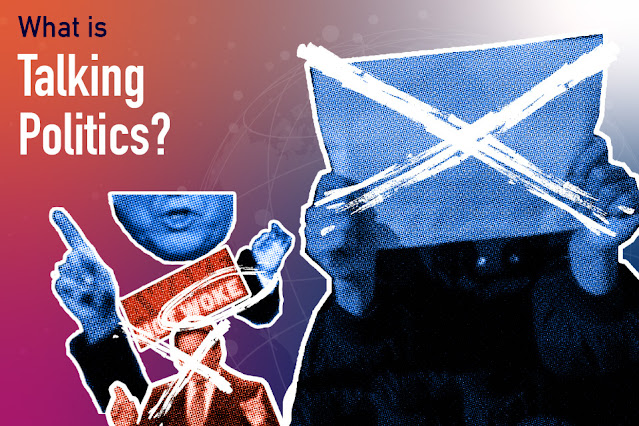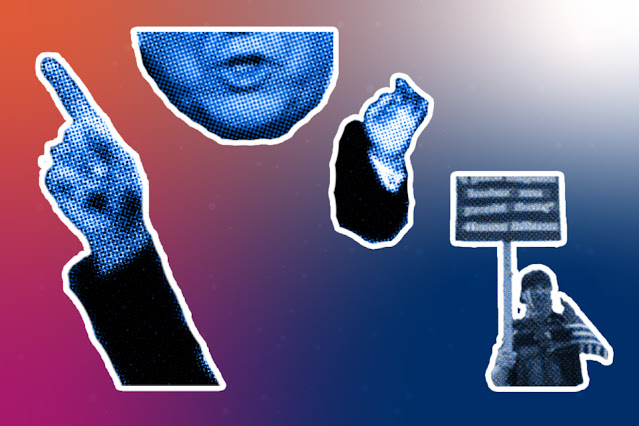(By Joshua Babcock)
As Talking Politics 2023 kicks off, we thought it might be helpful to start by answering some of the most basic questions about the series. Questions like: What is talk? What is/are politics? And how do the two connect?
When we say “basic,” we don’t mean these questions are easy or that you’ve never thought about these things before, just that these are some of the important, ground-level concepts and ideas that our presenters will be working with.
First, talk/talking.
In this series, when we say “talk” or “talking,” we actually mean “real-world language use” in a broad sense. This could be writing, signing, gesturing, speaking, and/or posting memes, to name a few. People talk about politics and also talk to accomplish things that we think of as specifically or uniquely political, like deciding who to vote for, debating public policies (whether as a policymaker or informally with friends), deciding to support a ballot initiative/referendum, speaking at a public forum like a parliamentary session or school board meeting.
You might think that we’re talking about words and meanings, or maybe about the way we combine words into larger segments, like sentences, conversations, and speeches. That’s definitely part of it. But as the saying has it: it’s not (just) what you say, it’s how you say it. Meanings can be changed, manipulated, or even inverted by a tone of voice, an accent, how fast you speak, a facial expression, the identities of the participants in an interaction, the ways a setting/event is organized, etc. All of this is potentially, but not automatically, relevant when experts set out to study talk as it actually happens in the world.Second, politics.
This term can refer to “politics” in a narrow sense—things like elections, political parties, governments, and public institutions—but the category of “politics” is also much broader. This is reflected in everyday talk: people call things like the Oscars and media awards “political.” We also talk about corporations or celebrities “getting political.” In these uses, “politics” means something like “making a phenomenon into a battleground for something beyond it (and doing it inappropriately).” We sometimes talk about friend group politics, office politics, and the politics of culture. Here, “politics” might mean something more like, “competing ways of acting and doing things that produce consequential outcomes or effects.”
In this series, we embrace all these meanings (and more). In its broadest sense, politics is about power, history, and the ways we pursue our interests, whether individual or collective. It’s about who gets what, where, and how, but this also includes issues of who gets represented (or not), where, how, and with what possibilities for contesting outcomes or offering alternatives.
As you likely already guessed, politics always involve language in some way, if only through its conspicuous absence. We talk about politics, and we talk to do political things. Vice versa, language itself is always political. The language you speak and how you speak it; who is allowed to speak and/or participate in society; and who is ignored (or silenced, as we’ll discuss in a future post)—all of these turn out to be political, too.
Talking Politics in 2020: The New Normal, History, and Language Beyond Words
Content advisory: mentions of hate speech, state violence, and racism
So what does this look like? Perhaps unsurprisingly, there’s no one answer. In our 2020 series, experts explained the interconnected histories of eugenics, geopolitics, racist pseudo-science, and patriarchal control of women (among other things) that shaped the seemingly innocent ways that President Trump used language to praise his children’s looks and bodies and denigrate refugees at the U.S./Mexico border.
Similarly, Dr. Jonathan Rosa described how the seemingly innocent desire for a return to or move toward the “(new) normal” turns out to be political, as well, since this desire raises the questions like: what is “normal,” and for whom? And was the previous “normal”—a condition that both allowed someone like Trump to be elected in the U.S. in the first place, and allowed for the ongoing police and other state-sanctioned or extrajudicial murder of Black, brown, and Indigenous people worldwide (to paraphrase a definition of racism by the geographer Dr. Ruth Wilson Gilmore)—really something we should be trying to return to?
Beyond the words Trump and other politicians used in 2020, our experts also analyzed things that can usually be hard to pin down or explain, even if we intuitively know they matter. For instance, Dr. Michael Lempert explored the gestures and body language Trump used while talking, and Dr. Adam Hodges explored the strategic disconnect between so-called “literal meanings” in language and the things that everyone knows politicians actually means (you probably know these as “dog whistles,” but this strategy comes in other flavors, too).
Talking Politics in 2023, from “Wokeism” to Global Democracy
Content advisory: mentions of hate speech, state violence, and racism
For a slightly more recent example: in January 2023, Florida Governor Ron DeSantis delivered a highly publicized speech that political commentators in the U.S. recognized as a step toward his forthcoming U.S. presidential bid based in an anti-“woke” platform. In the speech, DeSantis announced: “Florida is where woke goes to die.” Ishena Robinson, Deputy Director of the Legal Defense Fund, has written an incisive and thorough critical account (including an illustrated timeline) of how “woke” has been twisted from meaning “Black” to “bad,” and how this warped meaning now circulates as a dog whistle for the American right.
This history is necessary to understand how racism and anti-Blackness get masked through strategic disconnects between the meanings of words and their not-so-subtle implications, but alongside this, we can also analyze the expression of “woke” as a formal structure to further understand how these effects are created. This might go as follows: “woke” is an abstract concept. An abstract concept cannot die. But what kinds of entities can die? What does this tell us about how listeners are cued to take up DeSantis’s call? How do his listeners know “woke”-ness? Where do they encounter it?
“Woke,” like other abstract concepts, is always defined with concrete examples. For instance, the abstract concepts of truth, beauty, and justice are encountered in their embodied instances: true statements, beautiful things (and people), and actions that uphold justice (or not). “Woke” is no different. It is embodied as something that someone is, or is perceived to be. When viewed in these contexts, together with the history that writers like Robinson excavate, we might ask: even on a linguistic level, is DeSantis’s political call actually subtle at all?
For yet another example: in November 2022, protesters in China and the diaspora took to the streets to protest the Chinese state’s COVID-19 policies, which had continued to severely restrict people’s ability to move throughout the country. After an apartment fire claimed the lives of 10 people in Ürümqi—the capital city of the Xinjiang Uyghur Autonomous Region—reportedly because they were unable to escape due to COVID-19 restrictions, thousands of protesters marched and held vigils while holding blank white sheets of paper. This earned the movement the name, the “White Paper” protests.
The choice of medium was strategic. It was linked to the 2019–20 “Be Water” tactic in pro-democracy protests in Hong Kong, where protesters held blank sheets of paper to avoid identification and reduce the likelihood of arrest. Yet it also drew on the available symbolism of the blank sheet of paper itself. A quote from a Beijing protester that circulated widely in western media signified this especially clearly: “The white paper represents everything we want to say but cannot say.” Here, a blank sheet of paper is still full of meanings—meanings that are connected to broader histories, to individual and collective actions (like gathering in the streets), and to other pieces of language (like the quotes shared on social media, reports in the press, protest chants, etc.).
. . . . . . . . . .
Politics is everywhere. Language is everywhere. But that doesn’t make this observation meaningless. The specifics still matter, whether those specifics are to be found in histories, choice of words, details of the delivery, the choice of medium, the form of the message, or elsewhere. To take a deeper dive into this topic, we encourage you to check out the resources linked in this blog post and below, in addition to registering for the events in Talking Politics 2023: Silences + Voices in Global Media.
. . . . . . . . . .
Further Resources
Advanced + technical texts
Michael Lempert and Michael Silverstein. 2012. Creatures of Politics: Media, Message, and the American Presidency. Indiana University Press.Janet McIntosh and Norma Mendoza-Denton, editors. 2020. Language in the Trump Era: Scandals and Emergencies. Cambridge University Press.



Comments
Post a Comment